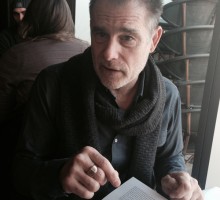American Poetry

Yankee Doodle (Sprit of ’76), A.M. Willard
by Daniel Bosch
The last gasps of the American revolutionary spirit were choked out in the Civil War, when the most conservative form of liberal government ever invented unhinged its jaws and swallowed its antithetical self, the South, whole — only to have to regurgitate some of its bones, of course, every twenty years or so since 1865. The lesson is that no revolution, no matter how revolting, can avoid the voracious maw of a stable Democratic Republic that will assimilate, digest, and even grow fat on anything.
The political is the poetical. America is so huge that any revolution will find its audience here and none can possibly disturb it. Our pilgrim protestantism is our special handicap: American poets believe in a personal poetics the way Luther believed in a personal God; alas, we usually skip any dreary reading of the scriptures on our way to revelation. (American poets start reading poetry only after they have started writing “poems.”) American poets don’t even really like poetry (cf. Marianne Moore); it’s a subject to avoid, like politics or religion. We cannot agree on what makes poems good. We cannot agree on what defines the craft. We bond, when we do, through our dislikes, and we will not be led, or defined, by anything but our personal constituencies. “Don’t Tread On Me” and “Live Free or Die!” were slogans on American revolutionary-era snake flags; those snakes were severed.
The unity of American poetry can be heard in our relatively democratic, demotic voices. Yet even a plain-speaking American poet is apt to dislike two or more of the following “schools” for one or more reasons: Beat poetry (too loose structure, anti-establishment rhetoric, often bi- or homosexual as if that were interesting); Formalist poetry (uptight structure for its own sake, dead white pseudo-establishment rhetoric, often homosexual); L=A=N=G=U=A=G=E poetry (nonce or non-traditional structure, arhetorical—the last thing it wants to do is convince anyone of anything); Slam poetry (dramatic structure, anti-establishment rhetoric enhanced by screaming, pansexual); World poetry (sounds like translation, employs traditional European rhetorics, often bi- or homosexual as if that didn’t matter); and the poetry of Personal Growth (loose structure, earnest anti-establishment rhetoric, pan-sexual—all in fear of casting judgment.) Some poets do crossover: in the Haight-Ashbury, for instance, it used to be cool to hate Ashbery; no more.
Gil Scott-Heron didn’t know how right he was when he forecast that “the revolution will not be televised.” He didn’t know he was pointing to the impossibility of revolution in a country where everything is televisual. (Seeing L.A. burn puts out fires in Atlanta; Mark Strand on the internet encourages a beatnik in Seattle.) American poetry of the future will certainly be polyglot (the dominance of English will recede), published in cyberspace (less and less print), and defined by performances (preserved on CD and DVD) instead of text. Everything will be possible and nothing will matter to us all.
Postscript:
Some fifteen years ago the editors of the Routledge Encyclopedia of Contemporary American Culture solicited from me a set of entries on American (or transatlantic) poets (e.g. Bly, Bukowski, Plath, Lowell, Levertov). I was given 99 + 1 words in which to say what needed to be said about each of these writers. The writing of each of those disasters-by-subtraction was excruciating — and delightful.
The rigors of such miscomposition were a gateway drug. By the time I wrote the entry on “American Poetry,” above, for which I was allowed all of 500 words, it seemed the only way to say anything true was to lie my way through, to embrace the state of the nature of such impossibly compressed writing. Only by going negative, nasty, and brutish, could I also go so short.
The question is not whether my wrong-headed entry misconstrues American Poetry. The question is, does it fail to?
Reference:
“Poetry,” The Routledge Dictionary of American Popular Culture Robert Gregg, Gary W. McDonogh, Cindy H. Wong, eds. (2001 hardback, 2011 paperback, p. 566) ISBN # 0-415016161-4
About the Author:

Daniel Bosch‘s poems and translations have been published in journals such as Poetry, Slate, The Times Literary Supplement, Agni, The Beloit Poetry Journal, The New Republic and The Paris Review. He was Poetry Editor at Harvard Review for issues 19 and 20. In 1998 he was awarded the Boston Review Poetry Prize for a set of poems riffing on films starring Tom Hanks, and his first collection of poems, Crucible, was published by Other Press in 2002. Recent essay-reviews by Daniel can be read at Artsfuse, Contemporary Poetry Review, The Critical Flame, The Rumpus and The Fortnightly Review. He lives in Chicago.









